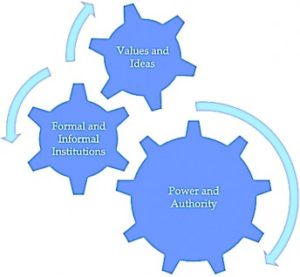Political Economy
New directions in macroeconomics for the 21st Century – Asad Zaman

Olivier Serrat, in “Political Economy Analysis for Development Effectiveness” [1] says that:
“ In a nutshell, political economy analysis investigates the interaction of political and economic processes in a society; in the context of historical legacies, this entails comprehending
-
The power and authority of groups in society, counting the interests they hold and the incentives that drive them, in conducing particular outcomes;
-
The role that formal and informal institutions play in allocating scarce resources;
-
The influence that values and ideas, including culture, ideologies, and religion, have on shaping human relations and interaction. “ In what follows, Prof Asad Zaman discusses some major perspectives that arise in the old and new political economy analyses. [Ed].
This is part of a sequence of posts on “New Directions in Macroeconomics“, which discusses the numerous direct- ions of research which must be incorporated to create a viable macroeconomics for the 21st century. We have previously discussed “Post-Keynesian Economics“, and “Modern Monetary Theory”. This post now discusses the necessity of re-incorporating politics into economics.
Once we recognize the importance of history and institutions, it becomes clear that economic problems cannot be separated from politics and society. The interplay of class interests, and their
relative power, is of essential importance in understanding political and economic structures of society. Current commitment to methodological individualism has blinded economists to these aspects, and left them unable to explain burning issues like the rapid increase of income inequality in the wake of financial de-regulation. There are many different perspectives from which the inter-relationships between politics and economics can be analysed.
Marxian Perspective
Although the Marxian prediction of the demise of Capitalism has proven to be wrong, the methodology and tools that Marx developed yield deep insights not available within the orthodoxy. Moore (2015) shows that dynamics of capital- ism require ever increasing exploitation of all available resources. However, with the imminent exhaustion of planetary resources on a global scale, capital- ism, appears to have reached its final frontier. A key Marxian insight is that exploitation is enabled by an ideology which creates an appearance of fairness, necessity, desirability, and attractiveness of the capitalist economic system. Unlike orthodox macroeconomics, Marxian theory is well suited to under- standing the global nature of capitalism; for key references to this, see Burnham (2001).
Marxian analysis is also very helpful in understanding the increasing tendency to inequality and exploitation, which is responsible for the inherent instability, and repeated crises, of the capitalist economy. Harvey (2017) is a useful introduction to the contemporary under- standing of Marxian theory, along with a critique of orthodoxy.
The Great Transformation: Karl Polanyi’s famous book The Great Transformation provides a deep analysis of the transformation in the UK from a traditional society to a market society. As he shows, emergence of the market mechanism created conforming changes in politics, society, and our attitudes towards the planet and people. Polanyi shows how social transformations work through collective efforts of classes, which are embodied in the form of institutions.
However, he does not take classes and institutions as exogenously given, but rather, he shows how social transformation can create or destroy classes, and also institutions, in accordance with shifting balance of powers created by a complex of forces which act from within or without. I have previously articulated three major methodological principles used by Polanyi for the study of social change. All three run counter to received wisdom in contemporary economic methodology, and therefore furnish the basis for an alternative 21st Century approach to economics.
The New Political Economy: Many have come to realize the impossibility of understanding economic crises of the past century without taking into account their political and historical context, as well as a deep analysis of the institutional structures. See for example “There is no economics with- out politics” by Admati (2019). This has led to the emergence of a new eclectic approach to the study of close connect- ions between politics and the economy. The recently established Department of Political Economy at Kings College in London provides as raison d’etre: “In a world characterized by financial uncertainty, ecological insecurity and value conflict, the links between political and economic processes are ever more apparent and the need for a multifaceted appreciation of how they operate, has never been greater.” As an illustrative example, Lemann (2019) provides an account of how economic theories, combined with political power, reshaped institutions and policies to dramatically change the social, political, and economic landscape over the past century. Combining political, institution- al, and historical methods leads to deep insights into the workings of our economic system not available within the orthodoxy. A comprehensive and thorough book-length is provided in a
draft textbook on Political Economy by Daron Acmeoglu (2020).
To read my full paper on this topic, with complete references, see: International Econometric Review, Vol 12 No.
1 (or the SSRN version).
1. https://link.springer.com/chapter/10.1007/978-981-10-0983-9_21
Article Source: WEA blogs, 29 Sept 2020
https://rwer.wordpress.com/2020/09/30/political-economy-2/
https://weapedagogy.wordpress.com/2020/09/29/political-economy/



























